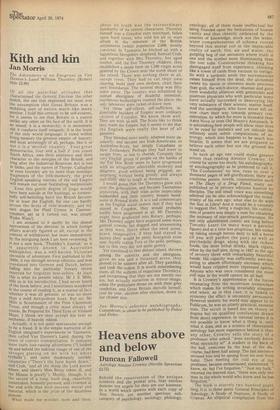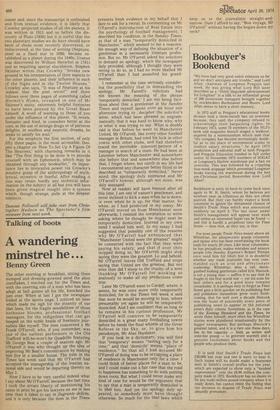Heavens above and below
Duncan Fallowell
Astrology Aleister Crowley (Neville Spearman £2.75) Behold the resurrection of the antique sciences and the primal arts, fear neither demons nor angels for they are our kinsmen. In a world which spawns with each copy of New Society yet another specious subcategory of psychology, sociology, philology,
ontology, all of them made ineffectual for being founded upon the limitations of human vanity and thus cheerily embraced by the usurers of knowledge, mock not the wider, wiser comprehensions of schema rooted beyond this mortal coil in the implacable reality of earth, fire, air and water, the gurgling bog of our ancestors where truth is one and the symbol more illuminating than the test tube. Constructivist thinking has disengaged itself from experience, climbing like a tower of cards from vacuum to vertigo. So with a sardonic smile the necromancer raises himself from the dead, the alchemist twists his spoon in elements more precious than gold, the witch-doctor, shaman and guru form wonderful alliances with geneticists and quantum physicists who with particular irony have actually succeeded in destroying the very substance of their science, matter itself. And the astrologers, who have never left us, now chart their way towards primary consideration, by which far more is intended than Astra Nova or even Old Moore's Almanack. It Is astonishing how people will allow their lives to be ruled by statistics and yet ridicule the infinitely more subtle computations of astrology, which also happens to be much less fatalist. It seems that we are prepared to believe each other but not the ground we stand on.
In such an age one could make greater errors than reading Aleister Crowley. Of course he wrote too much; his autobiography, or autohagiography as he preferred to call it, 'The Confessions' no less, runs to over a thousand pages of self-glorification; there are countless poems, novels, commentaries such as The Diary of a Drug Fiend, many unpublished or in private editions hunted by disciples. The still small voice was something admired yet he also acknowledged the monstrosity of his own ego: what else to do with the Sun in Libra? And it would be a calumny to suggest that, being a magician, his cultivation of powers was simply a ruse for obtaining the intimacy of star-struck gentlewomen. He not only adumbrated cosmic sex long before Timothy Leary (in many ways a parallel figure) and at a time less propitious, but ended up taking enough heroin daily to kill a horse (if you will pardon the pun) as well as psychedelic drugs, along with the richest foods, the most lethal drinks, black cigars, ether by the half pint, dying in 1947 at the age of seventy three with remarkably beautiful hands. His capacity was sufficiently awe-inspiring to absorb effortlessly excesses which would have crippled more repressed spirits. Anyone who was once considered the most evil man in the world cannot be all bad.
It is Crowley's apprehension of the forces emanating from the mystertum tremendum which makes his writing Invariably eloquent and when, as in this case, it is linked to economy the effect is uncannily persuasive. However esoteric his world may appear to Jo Publicum, he was an utterly practical, exoteric man. The occult is based not on theory or dogma but on qualified conclusions drawn from direct experience. In rational terms it is not possible to know what a thing is, only what it does, and as a science of observation astrology has more experience behind it than
any other. Crowley tells the story of a professor who asked "does anybody know what electricity is?" A student in the back of the hall, overcome by the heat of the discourse, had been half asleep. The last sentence aroused him and he sprang from his seat from habit. Then meeting the cold eye of the professor, became embarrassed, stammered, "I knew, sir, but I've forgotten." "Just my luck," retorted the learned man, "there was only one man in the whole world who knew and he has forgotten." The book is scarcely two hundred pages long. It is in three parts: General Principles of Astrology, A Study of Neptune, A Study of • Uranus. An elliptical compilation from the
outset and, since the manuscript is unfinished and from textual evidence, it is likely that Crowley projected studies of all the planets. It was written in 1915 and so before the discovery of Pluto (1930) but it is useful that the two planetary studies we do have should have been of those most recently discovered, or rediscovered, at the time of writing (Neptune, sited as a fixed star in 1690, became established as a planet during the 1840s; Uranus was discovered by William Herschel in 1781) and so requiring special elucidation. Stephen Skinner writes that Crowley "breaks new ground in his interpretation of their aspects to the other planets, and their influence in each of the Signs and in the Twelve Houses." Crowley also says, "It was of Neptune at his noblest that the poet wrote!" and there follows over three pages of something called Hermit's Hymn, revealed in one of Mr Skinner's many, extremely helpful footnotes to have been penned by the Great Beast himself. A word of warning to those of you under the influence of this planet. "It revels, fantastic and fond, in comedies bitter at the core, in the use of strange drugs or of perverse delights, in soulless and neurotic dreams, he seeks to satisfy his soul."
For the neophyte the first section, of only fifty three pages, is the most accessible. Despite a chapter on 'How To Set Up A Figure Of The Heavens,' with charming remarks in it like "The first thing to be done is to provide yourself with an Ephemeris, which may be obtained through any bookseller," its importance lies in invocative power via Crowley's intuitive grasp of the anthropology of myth, lyrical, eccentric or fearful. After reading it you may retain hardly any technical information on the subject at all but you will have been given magical insight into a system which, though strange, pulls at the deepest instincts.
Duncan Fallowell will take over from Christopher Hudson as The Spectator's film reviewer from next week.
Talking of boots



































 Previous page
Previous page